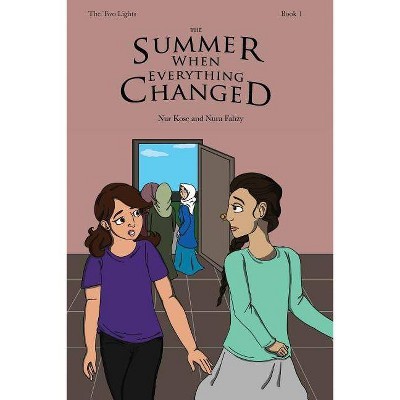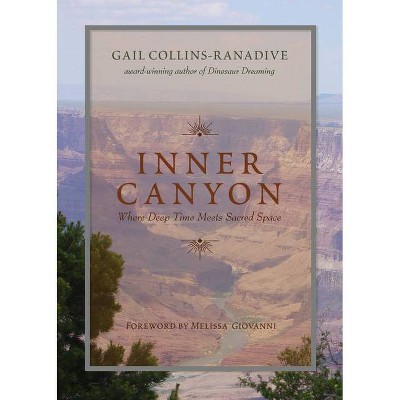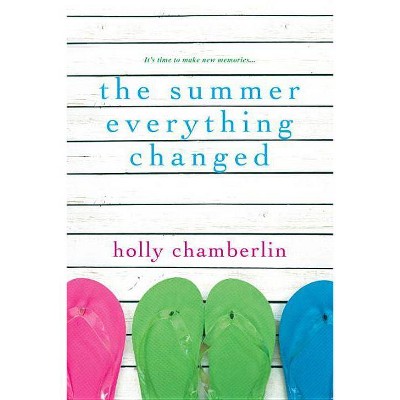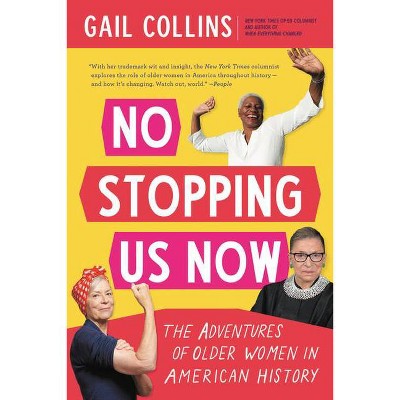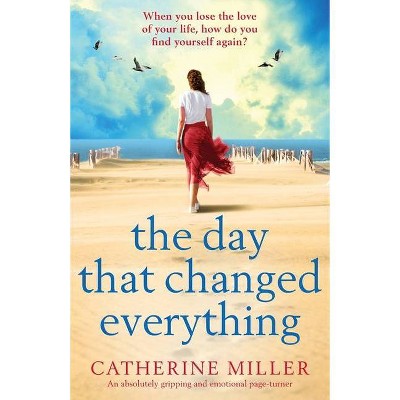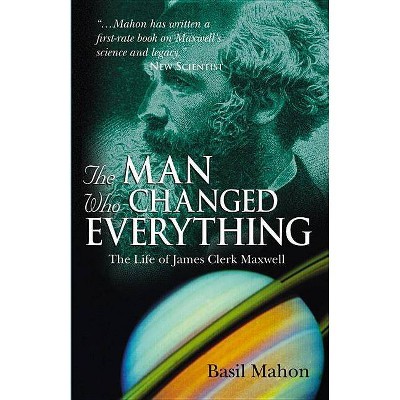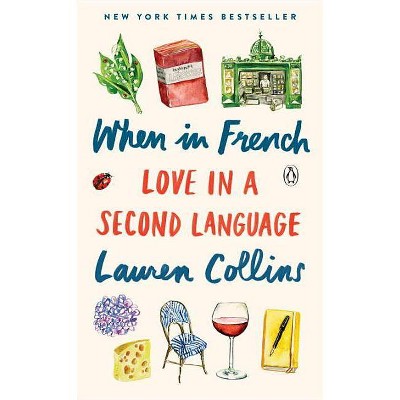When Everything Changed - by Gail Collins (Paperback)
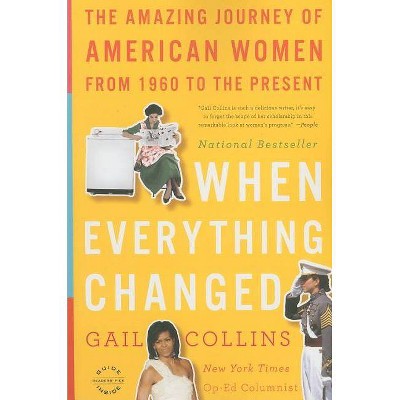
Similar Products
Products of same category from the store
AllProduct info
<p/><br></br><p><b> About the Book </b></p></br></br>Picking up where her previous successful book, "America's Women," leaves off, Collins recounts the sea change women have experienced since 1960. A comprehensive mix of oral history and keen research, this is the definitive book about five crucial decades of progress.<p/><br></br><p><b> Book Synopsis </b></p></br></br><b>Gail Collins, <i>New York Times</i> columnist and bestselling author, recounts the astounding revolution in women's lives over the past 50 years, with her usual "sly wit and unfussy style" (<i>People</i>).</b> <p/><i>When Everything Changed</i> begins in 1960, when most American women had to get their husbands' permission to apply for a credit card. It ends in 2008 with Hillary Clinton's historic presidential campaign. This was a time of cataclysmic change, when, after four hundred years, expectations about the lives of American women were smashed in just a generation. <p/> A comprehensive mix of oral history and Gail Collins's keen research -- covering politics, fashion, popular culture, economics, sex, families, and work -- <i>When Everything Changed</i> is the definitive book on five crucial decades of progress. The enormous strides made since 1960 include the advent of the birth control pill, the end of "Help Wanted -- Male" and "Help Wanted -- Female" ads, and the lifting of quotas for women in admission to medical and law schools. Gail Collins describes what has happened in every realm of women's lives, partly through the testimonies of both those who made history and those who simply made their way. <p/> Picking up where her highly lauded book <i>America's Women</i> left off, <i>When Everything Changed</i> is a dynamic story, told with the down-to-earth, amusing, and agenda-free tone for which this beloved New York Times columnist is known. <p/> Older readers, men and women alike, will be startled as they are reminded of what their lives once were -- <i>Father Knows Best and My Little Margie</i> on TV; daily weigh-ins for stewardesses; few female professors; no women in the Boston marathon, in combat zones, or in the police department. Younger readers will see their history in a rich new way. It has been an era packed with drama and dreams -- some dashed and others realized beyond anyone's imagining.<p/><br></br><p><b> Review Quotes </b></p></br></br><br>"A revelatory book for readers of both sexes, and sure to become required reading for any American women's-studies course."--<b><i>Kirkus</b></i><br><br>"<i>Did feminism fail? </i> Gail Collins's smart, thorough, often droll and extremely readable account of women's recent history in America not only answers this question brilliantly, but also poses new ones about the past and the present."--<b>Amy Bloom</b>, <b><i>The New York Times Book Review</b></i><br><br>"'The past is a foreign country' is the kind of hallowed quotation that's resolutely opaque until you stumble on something that drives home its emotional truth. The uncanny feeling it references is that one that recurs frequently as you read <i>When Everything Changed</i>, the absorbing history of feminism and American women's lives by Gail Collins, the resident editorial fount of wry Midwestern common sense at <i>The New York Times</i>.... What Collins does, which so pitiably few pop-history writers do, is <i>bring the stories</i>, the anecdotes that come to life and pull you in."--<b>Ben Dickinson</b>, <b><i>Elle</b></i><br><br>"A lively account...Collins uses her great sense of revealing anecdote, engaging personalities, representative case histories, resonant stories, and startling details to defamiliarize a decade we thought we remembered, and to show how truly far American women have come in every aspect of their lives.... Collins's message is inspiring and timely, and all the techniques she employs to make this book fun to read--and impossible to deny--deserve critical praise as well as popular success."--<b>Elaine Showalter</b>, <b><i>Progressive Book Club</b></i><br><br>"Among the impressive features of Ms. Collins's book is her genial, fair-minded sympathy, her refusal to smirk at the excesses of the most radical '70s feminists or at the stance of women, among them Phyllis Schlafly, who counseled their sisters to stay home where they belonged."--<b>Francine Prose</b>, <b><i>New York Times</b></i><br><br>"Collins, whose prose is vigorous and direct, has an unflaggingly intelligent conversational style that gives this book a personal and authoritative tone all at once."--<b>Cathleen Schine</b>, <b><i>The New York Review of Books</b></i><br><br>"Compulsively readable....Millions lived through the material Collins covers in her new book. To those who did not, it might read a little like science fiction."--<b>Chris Vognar</b>, <b><i>The Dallas Morning News</b></i><br><br>"Exhilarating, accessible, and inspiring."--<b>Katha Pollitt</b>, <b><i>Slate.com</b></i><br><br>"Gail Collins walks you through a fascinating five decades of history that shows you just how far women have come."--<b><i>LadiesHomeJournal.com</b></i><br><br>"I should mention that Collins is at the top of my guest list for my imaginary dinner party, the theme of which would be: 'Famous fun people I'd like to meet and talk with, but probably never will'...Readers will appreciate the exceptional detail with which Collins lays out the accepted universe of closed opportunities and limited horizons that women faced in 1960. Collins interviewed a variety of women from around the country, and it is fascinating to hear them describe a world that seems unthinkable now but which few could imagine challenging at the time....The stories that emerge are...deeply moving."--<b>Sharon Ullman</b>, <b><i>Boston Sunday Globe</b></i><br><br>"In a fascinating history, Gail Collins goes behind the scenes of the women's rights movement.... <i>When Everything Changed</i> provides a sweeping, fascinating look at modern women in our country. Filled with facts, court cases and legislation, the book is rich with personal anecdotes. Collins and her researchers interviewed more than 100 women for this history, and for many contemporary readers, their findings will be startling and sometimes heartbreaking.... The end of her book will make many readers swell with pride--it features updates on the lives of the interview subjects featured in the book, many of whom went on to break barriers for many years. The story their lives helped write--of American women from the 1960s to today--is inspiring and compelling."--<b>Eliza Borné</b>, <b><i>BookPage</b></i><br><br>"In her pithy, wide-ranging and readable new book, Gail Collins whisks us through nearly five decades of women's history... Famous names and familiar stories appear, but what is most compelling are the vignettes of women who would have remained obscure without the work of Collins and her research team. Through their stories we experience the rat-a-tat-tat of daily indignities--big and small--that built to a crescendo we now call the women's movement."--<b>Connie Schultz</b>, <b><i>The Cleveland Plain Dealer</b></i><br><br>"Provides a sweeping, fascinating look at modern women in our country.... It may be a history book, but <i>When Everything Changed</i> reads like a page-turning saga, a race through the years to learn how we got here."--<b>Eliza Borné</b>, <b><i>BookPage.com</b></i><br><br>"Readers familiar with her work will recognize her eye for ironic detail in this wry, insightful and comprehensive book...there are many wonderful, triumphal moments...Collins wants us to remember how bad things were in the 1960s, and she succeeds."--<b>Jill Lawrence</b>, <b><i>Politics Daily</b></i><br><br>"Riveting and remarkably thorough in its account of this tumultuous period.... Collins draws on an impressive variety of sources...and employs her engaging and accessible writing style to created a very readable history book."--<b>Rasha Madkour</b>, <b><i>The Associated Press, New York Times, Los Angeles Times, New York Post, New York Daily News</b></i><br><br>"Social history at its best."--<b>MiChelle Jones</b>, <b><i>Pittsburgh Post-Gazette</b></i><br><br>"Splendid...Collins is a masterful storyteller."--<b>Glenn C. Altschuler</b>, <b><i>NPR.com</b></i><br><br>"The new must-have text for modern feminists. Her simple message to our generation: We must not take our astounding journey for granted."--<b>Ami Angelwicz</b>, <b><i>The Frisky.com</b></i><br><br>"This is not only a fascinating record of how far women have come, it is also a missive to a new generation of women, reminding them to keep the faith."--<b>Katherine Boyle</b>, <b><i>Booklist</b></i><br><br>"Until now, the second wave women's movement hasn't had its big ambitious history--the equivalent to Taylor Branch's multivolume narrative of the civil rights movement....nothing as sweeping and accessible as this."--<b>Margaret Talbot</b>, <b><i>Slate.com's "Double X"</b></i><br><br>"What better time to look at American women's progress since the '60s, now that the dust has settled on the 2008 presidential election when so much was won (and lost) by women?... Gail Collins's near epic history <i>When Everything Changed</i>...also captures the playfulness and humor in women's advancement."--<b>Elizabeth Toohey</b>, <b><i>The Christian Science Monitor</b></i><br><br>"Women aren't nostalgic for the old days. If anyone is, just watch a few episodes of "Mad Men" as an antidote, with its suffocated Mad Wife Betty Draper and its slapped-down Working Woman Peggy Olsen. If you prefer nonfiction, leaf through the early chapters of Gail Collins's history <i>When Everything Changed</i> to those magical yesteryears when a flight attendant was weighed, measured, and hired to be a flying geisha."--<b>Ellen Goodman</b>, <b><i>The Seattle Times</b></i><br><p/><br></br><p><b> About the Author </b></p></br></br><b>Gail Collins</b> is a columnist for the <i>New York Times</i>. From 2001-2007 she was editorial page editor of the paper -- the first woman to have held that position.
Price History
Price Archive shows prices from various stores, lets you see history and find the cheapest. There is no actual sale on the website. For all support, inquiry and suggestion messages communication@pricearchive.us
